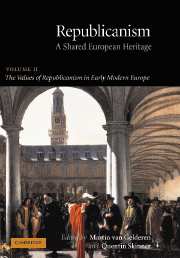Book contents
- Frontmatter
- Contents
- Contents of Volume I
- Acknowledgments
- Introduction
- Part I Republicanism and Political Values
- Part II The Place of Women in the Republic
- Part III Republicanism and the Rise of Commerce
- 10 Republicanism and Commercial Society in the Scottish Enlightenment: The Case of Adam Ferguson
- 11 Scots, Germans, Republic and Commerce
- 12 Neo-Roman Republicanism and Commercial Society: The Example of Eighteenth-century Berne
- 13 Republicanism and Commercial Society in Eighteenth-century Italy
- 14 Republicanism, State Finances and the Emergence of Commercial Society in Eighteenth-century France – or from Royal to Ancient Republicanism and Back
- 15 Commercial Realities, Republican Principles
- Bibliography
- Contributors
- Index of Names of Persons
- Index of Subjects
14 - Republicanism, State Finances and the Emergence of Commercial Society in Eighteenth-century France – or from Royal to Ancient Republicanism and Back
Published online by Cambridge University Press: 11 January 2010
- Frontmatter
- Contents
- Contents of Volume I
- Acknowledgments
- Introduction
- Part I Republicanism and Political Values
- Part II The Place of Women in the Republic
- Part III Republicanism and the Rise of Commerce
- 10 Republicanism and Commercial Society in the Scottish Enlightenment: The Case of Adam Ferguson
- 11 Scots, Germans, Republic and Commerce
- 12 Neo-Roman Republicanism and Commercial Society: The Example of Eighteenth-century Berne
- 13 Republicanism and Commercial Society in Eighteenth-century Italy
- 14 Republicanism, State Finances and the Emergence of Commercial Society in Eighteenth-century France – or from Royal to Ancient Republicanism and Back
- 15 Commercial Realities, Republican Principles
- Bibliography
- Contributors
- Index of Names of Persons
- Index of Subjects
Summary
One reason for the immense popularity of Fénelon's Telemachus during the eighteenth century was its clarity about the prospects for Europe's future. As Fénelon presented it, Europe had to find a way to promote trade and prevent war. The problem, from Louis XIV's wars onwards, was that trade had become deeply entangled with war because of the increasing use of public credit to fund the costs of war, turning trade into a source of tax revenue for interest payments and generating a deadly competition between the great powers to acquire, or prevent others from acquiring, the resources needed to fund their debts. As one of the principal agents of the Stuart pretender to the British throne informed the marquis d'Argenson in 1755, on the eve of the Seven Years War, the rivalry between England and France was ‘like an affair of grocer to grocer, whose quarrel will come to an end only when they have each discredited one another’ (Voyer de Paulmy 1852–67: 59–60). In the British case, d'Argenson noted, this could be achieved by a Jacobite rising accompanied by a Stuart proclamation to cancel all the debts contracted by the house of Hanover. He did not bother to record what the French equivalent might be, but it is not too difficult to imagine. As Arthur Young noted soon after the end of the Seven Years War, the French system of absolute government was a powerful advantage in ‘an affair of grocer to grocer’.
- Type
- Chapter
- Information
- RepublicanismA Shared European Heritage, pp. 275 - 292Publisher: Cambridge University PressPrint publication year: 2002
- 4
- Cited by



